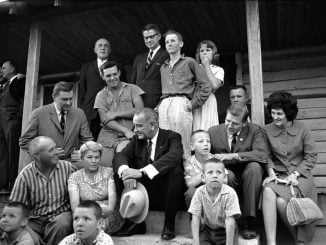
The main selling point Joe Biden preaches on his presidential campaign stops is simple:
If you want to end the partisan gridlock in Washington, D.C, he’s your guy. He’ll tell you he’s sometimes worked with Republicans to get legislation passed, including during his years as President Barack Obama’s V.P.
He’ll also talk about how he struck legislative deals with segregationist U.S. senators in the 1970s.
As it turns out, the latter is only slightly more offensive than the former to modern Democrats, as we learned last week when the Democratic frontrunner spoke at a New York fundraiser about how he got along with Sen. James Eastland (D-Miss.) and Sen. Herman Talmadge (D-Ga.) in the early ’70s.
Both senators were avowed segregationists. Of Eastland, Biden said “He never called me ‘boy,’ he always called me ‘son.’” Of Talmadge, Biden remarked that in spite of him being “one of the meanest guys” he ever knew, that “at least there was some civility. We got things done.”
Biden’s overall point was that sometimes you have to work with people you don’t necessarily like in order to get things done. It seemed clear he wasn’t lavishing high praise on either senator, but Democratic candidates who have struggled to gain traction in the crowded field of contenders pounced on Biden’s statements as evidence he is out of touch and should know better.
Sen. Kamala Harris (D-Calif.), who has polled mostly in the single digits since declaring her candidacy in January, said that for Biden “to coddle the reputations of segregationists, of people who, if they had their way, I would literally not be standing here as a member of the United States Senate is, I think, it’s misinformed and it’s wrong.” She did not call for him to apologize.
Sen. Cory Booker (D-N.J.), whose polling numbers have consistently been worse than Harris’, said Biden’s “relationships with proud segregationists are not the model for how we make America a safer and more inclusive place for black people, and for everyone.” He demanded an “immediate apology.”
Biden refused, and in turn told Booker he was the one who needed to apologize for insinuating he was a racist.
Both Harris and Booker reiterated their criticisms Sunday, with Booker adding that he had heard “from many, many African Americans who found the comments hurtful.”
Two African Americans who did not find Biden’s comments “hurtful” were Congressmen James Clyburn (D-S.C.) and John Lewis (D-Ga.). Lewis told reporters that during the ’60s and ’70s he had to sometimes work with members of the KKK and other racists. “We never gave up on our fellow human beings, and I will not give up on any human being,” he also said.
“You don’t have to agree with people to work with them,” responded Clyburn when asked about Biden’s comments. “I worked with Strom Thurmond all my life.”
Not noted in news stories on the controversy is that Harris and Booker have few bipartisan accomplishments to speak of. Biden, on the other hand, does. And therein lies the real problem.
In making this a racial issue, Harris and Booker are trying to hit Biden on two of his strengths: his occasional forays into bipartisanship and the fact he’s polling much better with black voters than other candidates.
But both Clyburn’s and Lewis’ defenses of him will almost certainly negative whatever criticisms Harris and Booker have left for Biden in the coming days.
Some conservatives have even found themselves over the last few days in the rare position of agreeing with both civil rights icons and the former vice president.
Joe Biden has said and done a lot of things over the years worth criticizing. Noting that sometimes you have to work with the political opposition is not one of them.
Stacey Matthews is a veteran blogger who has also written under the pseudonym Sister Toldjah and is a regular contributor to Red State and Legal Insurrection.


